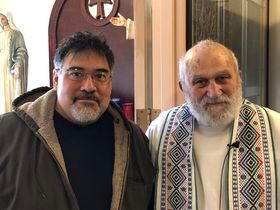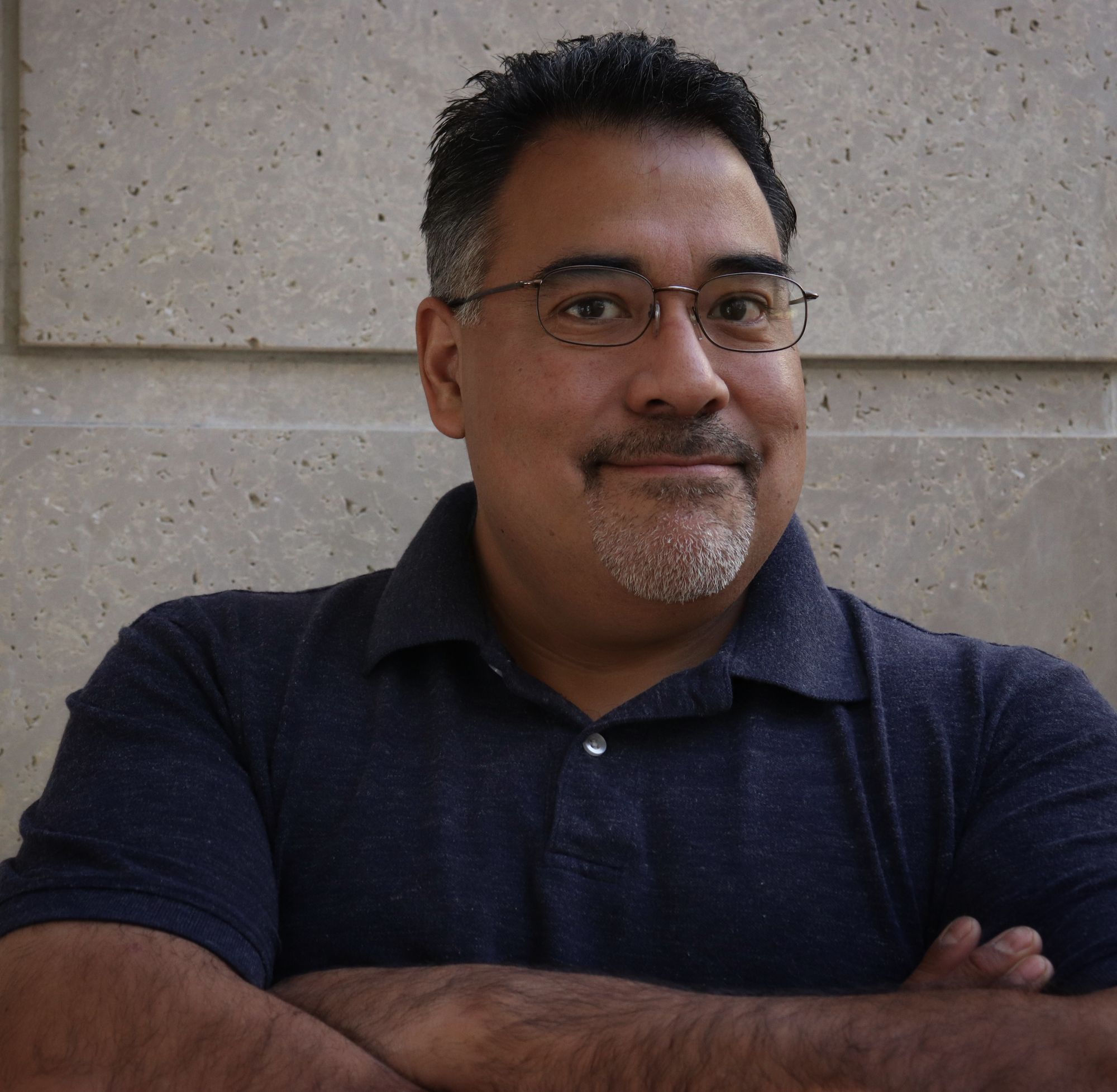I recently attended the wake of Fr. Raymond Monsour, who after a long and eventful life, passed away earlier this month. Fr. Monsour was a notable figure here in Saint Paul, especially in the West Side and District del Sol neighborhoods where he was the pastor of Our Lady of Guadalupe Catholic church during the 1970’s. During that time, my family attended church there and I was an altar server at both the Spanish and English masses. The West Side and the District del Sol were the homes of the largest Mexican-American community in Minnesota, and Our Lady of Guadalupe was and remains a fixture in the community to this day.
It is interesting to note that only later in life did l learn that despite being fluent in Spanish and knowledgeable of the culture and traditions of his parishioners, Fr. Monsour was not Latino. He was Lebanese by birth, was the fourth of six children and grew up speaking Arabic in his home. For along with the Mexican-Americans who lived in the West Side, there was also a substantial Lebanese community there as well, along with (at the time) a small local church- Holy Family Maronite Church.
While discerning the priesthood, Fr. Monsour’s parents knew he could not (as a Maronite) get into the local seminary in Saint Paul, and there were no Maronite seminaries in the U.S. at the time. However, through some special arrangements Fr. Monsour was formed to be bi-ritual so that he could be ordained as a priest in the Roman Rite while retaining his Maronite roots. After he was ordained, he spent four years as a missionary in Venezuela (where he honed his Spanish-speaking skills), until he returned to his old neighborhood to serve as pastor at Our Lady of Guadalupe.
The majority of my memories of him were from my childhood during the formative years of my Catholic faith, although I ran into him as an adult from time to time- mostly at funerals. I remember him as an erudite and kind man, a patient teacher, and someone who was deeply involved in the lives of his flock. In all seasons and situations, in good times and bad, he was the kind of shepherd who certainly smelled like the sheep he was entrusted with. And this was no small thing, and was an absolute necessity during the 1970’s which were a time of great immorality and upheavals in American society and the Church.
And yet, despite his foibles and failings, he remained a man of faith and free of scandal. He modeled a strong but stoic faith that remained firmly on Peter's Barque regardless of the tumultuous cultural seas it sailed through. While my view of him has matured, it has not changed. Looking back on my life, I can certainly see how his presence shaped my faith life for the better, and how the absence of a shepherd like him shaped it for the worst. With that in mind and after some personal reflection, I can think of no better way to honor the memory of Fr. Monsour, then to offer up what his life as a good shepherd taught me about remaining steadfast in the faith.
1. The Church is Only as Strong as the Families in It
Our Lord promised us that the gates of Hell would never overcome his church, and as far as the Church Triumphant goes, this is true. However, when it comes to the Church Militant on this side of the glass veil, our churches are only as strong as the families (the domestic church) that show up to mass. I once commented, when talking about the film Coco, that it accurately portrayed life in a Mexican family, in that your family often times ended up being both the cause and cure of so many of the problems in your life.
This is as true as it ever was in our contemporary atomized, entitled, pampered, self-centered and religious-less culture, as most Catholic families have “gone native” and are now fully “in the world.” Those that haven't jumped the Barque are left to bear the brunt of secular society’s ire when it doesn’t get its way. Today there seems to be a tension within the Church between living out a Benedict Option by removing oneself from the world, and a kind of Maccabee Option that is ready to “enter the breach” and take on the godless ways of the world. In truth, a balance of the two is required but that is something that is best done under the guidance of a holy shepherd. A priest or bishop who understands that it is strong families that produce strong Catholics who are capable of both “Options” and who in turn will build up a stronger and holier Body of Christ within our churches.
My memories of Fr. Monsour were of a priest who knew that like churches, families were in constant need of conversion and renewal, and of course sacramental grace to deal with a rapidly changing world that has only gotten more hostile to the faith.
2. The Church is Strongest When People Know their Faith
While Fr. Monsour did much to encourage a life of faith, family, and tradition, the same could not be said about the people he chose to implement his guidance. Now, my words are not meant to personally disparage anyone, as the names and faces of the people who taught catechism classes in my youth are now only a vague memory. But it does mean that it is one thing to want to volunteer your time and services to the Church, but it is another to do it half-heartedly or worse, in ignorance of the faith.
If we want to pass on a faith that will grow and bear fruit, then we have to know our faith, understand our faith, and to have enough experience with it to have had it challenged, and yet still remain in it. A perfect example of this, from my own experience of growing up Catholic as a Mexican-American in the 1970’s and 80’s, is the damage done by Liberation Theology. At the time, it was nothing so obvious as the “smoke of Satan” creeping into the church, but more like a maliciously musky Marxist odor that certain people started bringing into it. In time the people around me came to accept that particular scent of Catholicism as normal, to the point that for most part, the Church in Hispanic circles turned into just another social justice institution.
It was only later, after the Iron Curtain collapsed and the truth of Liberation Theology’s origins were revealed, when I went to college and met faithful and knowledgeable Catholic men, did I learn that I had been sold a bill of goods. That was a problem that should’ve been addressed long ago, but by then the damage had already been done, as currently almost none of my family practices the faith in any semblance of orthodoxy, if at all. And when I went to my aunt’s funeral awhile back at Our Lady of Guadalupe, the priest was savvy (if not jaded) enough to say at the mass that only those who were properly disposed to (or who wanted to) receive communion could do so after mass. Out of the 200 or more people there, I was the only one who came forward afterwards.
Finally, knowing our faith is more than just book knowledge, but is also living and experiencing it. The fact that Fr. Monsour was bi-ritual eventually led me to investigate the other rites within the Catholic church. This is something that really needs to be explored by Catholics, as doing so brings with it a wealth of knowledge about the faith that transcends history and cultures. I am proud to say that I have been to masses in the Roman, Byzantine, Maronite, and Syro-Malabar rites in my life. And while I would not say they are in any way fluent, I am happy that my kids are at least capable of going to masses in English, Spanish, Latin, Syriac, Aramaic, and Greek and knowing how to use the missal to respond accordingly.
3. A Strong Church Requires Strong Shepherds
And finally, if there is one thing above all the other things I can say I learned from the example of Fr. Monsour, it is the need for a strong and indomitable clergy that will protect and guide their flocks to hold fast and pass on the Church’s faith and traditions. When it came to Fr. Monsour, as an adult I now realize how taut of a line he had to walk between keeping watch over and keeping peace within his flock in the very fallen world of the 70’s. Between remaining true to our Lord and his Church and the hard work of working out one’s faith in fear and trembling, and the lure of the world and its quick and easy road to an ersatz form of salvation.
Such tension will always be the way of the world, and there will always be clergy who are good shepherds and those who are not. Unfortunately, it is sometimes easier to sit back and do nothing, or worse to just complain about it. There are now whole websites or pages on social media set up to talk smack and trash about the clergy from the Pope all the way down to parish priests and religious. While the frustration and sense of outrage is often very justified, the responses are sometimes not. Moreover, as Fr. Chad Ripperger recently said, “People often forget, the Old Testament taught us that you get the leaders you deserve. You start acting up and getting obnoxious, and you will get obnoxious leaders.”
Whether in the secular world or the Church, this reality has also become just another way of the world. However, as with all things, there is nothing new under the sun, as St. John Eudes said back in the 17thcentury,
“The most evident mark of God’s anger and the most terrible castigation He can inflict upon the world are manifested when He permits His people to fall into the hands of clerics who are priests more in name than in deed, priests who practice the cruelty of ravening wolves rather than the charity and affection of devoted shepherds. Instead of nourishing those committed to their care, they rend and devour them brutally. Instead of leading their people to God, they drag Christian souls into hell in their train. Instead of being the salt of the earth and the light of the world, they are its innocuous poison and its murky darkness.”
So if you want a strong church that will push back against “this wicked generation” then we will need holy priests. And if we want holy priests, then as St. John Eudes says, we need to first take a long look at ourselves in the mirror and commit to being holy people, who live holy lives, who raise holy families or pursue holy vocations.
This means that instead of complaining about and haranguing our priests, we should support them, encourage them, and of course pray for them. Priests are (and should be) busy enough with all of their other duties, so instead of whinging about the need for better music in church, better catechists, better book clubs, better fundraisers or more Theology on Tap-like events, then let it be you who steps forward and offers to arrange them. Of course, you may need to brush up on your faith a bit and commit to daily mass or meditation, but in the end, to paraphrase the non-words of St. Francis, we should be the ones to say, “Lord make me an instrument of your holiness, and let it begin with me.”

R.I.P. Fr. Raymon Monsour 1927-2022
Photo Credit- twincities. com
Second photo is of the author and Fr. Monsour taken in 2018.

